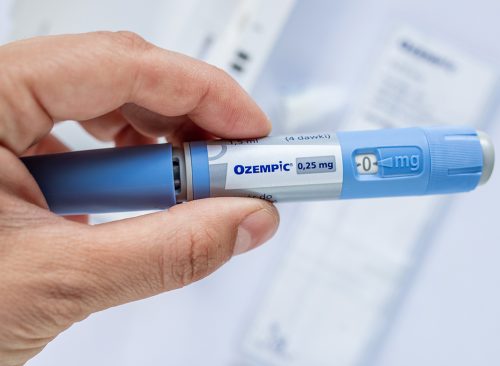Trulicity vs. Ozempic: Is One Safer? Doctors Weigh In

It seems like everywhere you look these days, there’s an advertisement for a new weight loss medication, or an article about a celebrity who’s rumored to be taking Ozempic. It can be confusing to keep track of all the different brands out there: Ozempic, Mounjaro, Trulicity, and Wegovy are just a few of the names you may have heard. And while some of these drugs are more or less the same (Ozempic and Wegovy are both brand names for semaglutide), others, like Trulicity, are a little different.
When it comes to the medication you’re taking, or considering taking, it’s always best to consult your healthcare provider about what’s best for you. However, if you’ve heard of Ozempic and Trulicity and are wondering what the difference is, what doctors have to say about them, and whether one is safer than the other, you’re not alone. Read on to find out how these drugs work, who doctors say should take them, and which one a doctor who spoke with Best Life prefers for weight loss.
READ THIS NEXT: People Are Saying Ozempic Is a Weight-Loss Miracle. Is It Worth the Brutal Side Effects?
Trulicity and Ozempic are both GLP-1 drugs.

While Ozempic and Trulicity are different drugs—Ozempic is a brand name for semaglutide, while Trulicity is dulaglutide—they’re not very different. “The two are within the same category, but the molecule is different,” explains Ana Maria Kausel, MD, an endocrinologist and co-founder of Anzara Health. Both are what’s known as GLP-1 drugs, which Kausel says she’s been prescribing to her patients for the past 10 years.
“GLP-1, or glucagon-like peptide-1, helps your body keep blood sugar in balance,” explains pharmacist Deepti Pidakala, PharmD. She says that both Ozempic and Trulicity help your pancreas produce insulin, as well as keeping your liver from “making and releasing too much sugar,” and slowing down your digestive system.
READ THIS NEXT: 5 Common OTC Medications Pharmacists Wish You’d Stop Taking.
Both medications are approved for use in patients with Type 2 diabetes.

If you’re interested in these drugs purely for weight loss, be advised that both Ozempic and Trulicity are approved by the U.S. Food & Drug Administration (FDA) only for use in patients with Type 2 diabetes. And while plenty of physicians are prescribing them off-label to people wanting to slim down, Kausel warns that Trulicity, in particular, may not be the best choice if that’s your goal.
“Trulicity is not that good with weight loss, especially at low doses,” Kausel says. “Clinical trials have shown weight loss at the highest doses, but this comes also with more side effects. I recommend Ozempic over Trulicity, because it has better weight loss at even small doses, and it’s better tolerated,” she explains. “I’ve had better experiences with Ozempic compared to Trulicity.”
The two drugs have similar side effects.

And what are those side effects? Well, you’re likely to feel them in your digestive system, says Kausel. “The majority of side effects are GI-related,” she explains, naming nausea, constipation, diarrhea, and heartburn as common complaints.
Pidakala warns that Ozempic, in particular, carries a potential increased risk of cancer. “Before taking Ozempic, all patients should know the risk of medullary thyroid cancers. Patients need to be counseled on this by their healthcare provider and continue monitoring for thyroid tumor symptoms,” she tells Best Life. “These include a mass in the neck, dysphagia, dyspnea, or persistent hoarseness.”
For more health news sent directly to your inbox, sign up for our daily newsletter.
Eating healthy and exercising regularly is essential either way.

Whether you and your doctor decide that weight loss medication is right for you or not, a healthy diet and exercise can go a long way toward helping you reach—and maintain—your goal weight. And if you’re dealing with diabetes, that’s true as well.
Louis Aronne, MD, an obesity medicine physician, told Today that vegetables and healthy proteins should be the foundation of your diet if you’re trying to keep your blood sugar and weight under control. “We’ve done studies showing that if you eat vegetables and protein first, and then have carbs towards the end of the meal, it actually is beneficial to your blood sugar, probably for your weight as well,” he told the outlet. “The cornerstone of the diet has to be real food… healthy food.”
Best Life offers the most up-to-date information from top experts, new research, and health agencies, but our content is not meant to be a substitute for professional guidance. When it comes to the medication you’re taking or any other health questions you have, always consult your healthcare provider directly.